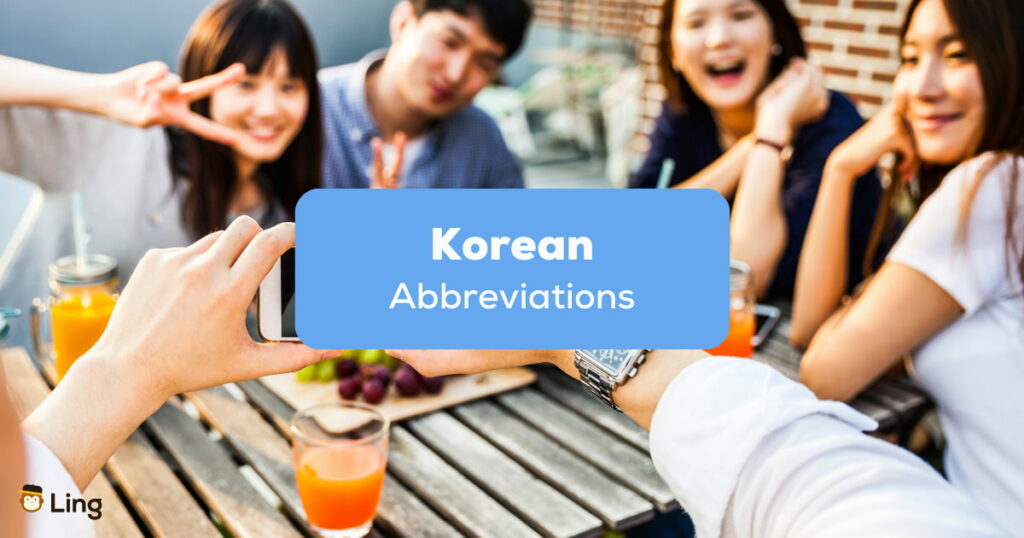Do you want to upgrade your Korean text messages? The important key is to use simple and trendy Korean abbreviations like ㅋㅋㅋ. Today, we’re learning lots of them! After all, who doesn’t send messages nowadays? Texting or chatting is one of the most common things we do daily. Of course, KakaoTalk is Koreans’ most famous platform when it comes to messaging.
In messaging, as you can see, even in Korean dramas, they use simple and cutesy words and phrases. It depends, of course, on whom you are talking to, but when texting with their friends, they mostly use Korean abbreviations and common Korean slang terms.
Just take the episode from Extraordinary Attorney ‘Woo’ as an example. In the said episode, the characters from the dramas use abbreviations to give cute nicknames and personalize their messages for each other. It’s amazing how few letters can be so meaningful to some people, right?
So, that is what we’ll talk about today in this blog post – Korean abbreviation. Brace yourself for a fun Korean language learning lesson!
Why Learn Korean Text Slang Like Abbreviations?
You might wonder, of all the important things to learn in learning Korean, why is learning Korean text slang important? For starters, South Korea is big in communications and network connections. They also own the highest percentage of smartphone ownership worldwide. In short, texting or chatting is one of the most significant forms of communication in South Korea that makes people digitally connected.
Another answer is that it makes you learn how native speakers speak in everyday life. It tells you a lot about their culture. Learning Korean words and phrases, even expressions and emojis or emoticons, is significant in studying Korean. There’s a lot to learn from everyday conversations. Of course, learning the formal language structure is as important, but slang like text slang words will make you sound like a local and give you a deeper understanding of their language.
In this lesson, you’ll also learn how these words are formed or where it was derived from.
Korean Abbreviations To Use With Your Korean Friends
Korean abbreviations prove how beautiful the Korean language is. It is a form of Korean text slang words formed in different ways like adapting English words, combining English and Korean words, or shortening the Korean words.
The Korean word for abbreviation is 약칭 (yakching). In learning Korean, it’s impossible not to learn abbreviations or Korean text slang words. In the previous blogs, you have learned the basic Korean slang words; now, you will understand some Korean abbreviations or Korean texting slang words.
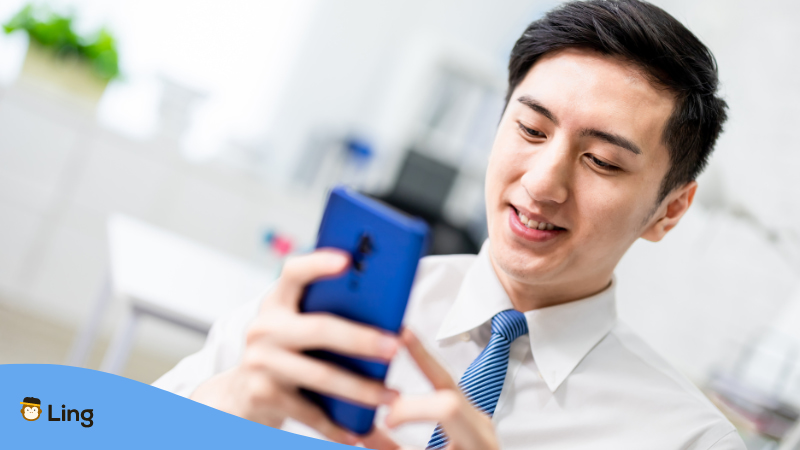
1. ㅎㅇ (Hi)
How to start a conversation? Well, one of the easiest ways is to simply say “Hi.” The Korean abbreviation for that is ㅎㅇ (hi) which came from 하이 (ha-ee). You can use this to start a conversation or, if you wanna, ask someone how they are through text messages.
2. ㅇㅋ (O K)
The trendy Korean way to say “ok” is by just making an “o” and a “k” with their fingers. But with text messages, you cannot do that. So what’s the easiest way to do it? Just type the abbreviation ㅇㅋ.
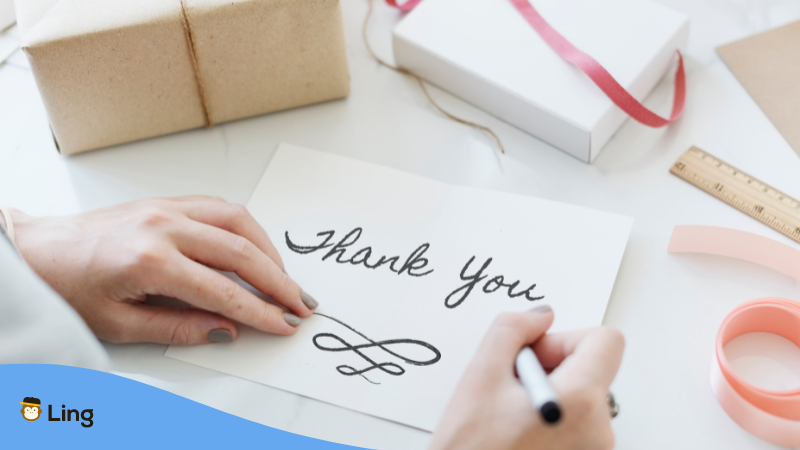
3. ㄱㅅ (G S)
The Korean word “감사합니다 (gamsahamnida)” or “Thank you” is probably one of the easiest words that you can pick up or learn easily. So, this abbreviation might be easy for you to understand. To abbreviate “Thank you” in Korean, just simply get write/type ㄱㅅ (gs) which translates to TY in English. It is short for 감사합니다, gamsahamnida.
4. ㅈㅅ (J S)
Replied late to someone? Missed someone’s call? Simply say ㅈㅅ (J S). This is the Korean abbreviation for 죄송합니다 (joesonghamnida), which literally means “Sorry” in English. You can use it in most situations but only for those lighter situations. But when it comes to heavy mistakes or problems, ㅈㅅ (J S) would probably never be enough.

5. ㅅㅇㅊㅋ (SCHK)
If you wanna greet someone with a Happy Birthday?, it only takes four letters which are ㅅㅇㅊㅋ (schk). It is the abbreviated version of 생일축하해” (saeng-il-chuk-ha-hae). You can use it with birthday emoticons to easily greet someone on their birthday, But of course, if you wanna go beyond just this abbreviation, you can also add some heartfelt birthday message.
6. ㅋㅋㅋ (Kuh-Kuh-Kuh)
Received funny text messages? The Korean abbreviation for that is ㅋㅋ (kuh-kuh) which means LOL or a sound of laughter. The more ㅋ you add, the more you are laughing. It is an onomatopoeia for laughter. If you try to sound it out, it’s the loud sound that people make when they laugh. It’s more of a cute way of laughing, and Koreans are known for that.
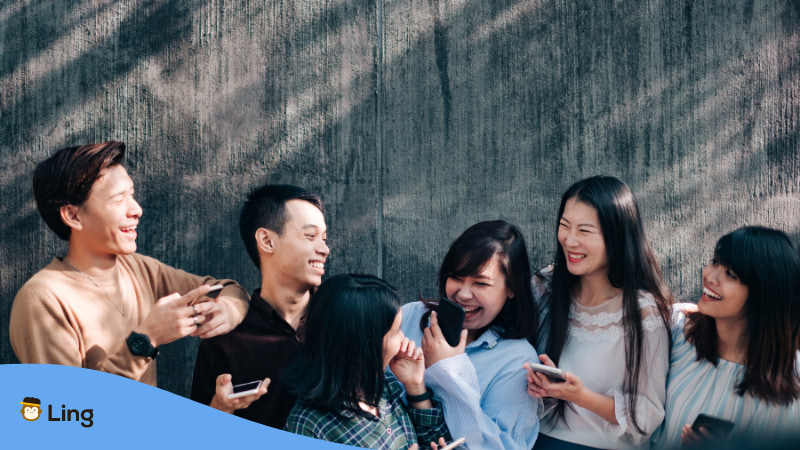
7. ㅎㅎㅎ (Ha-ha-ha)
ㅎㅎㅎ (Ha-ha-ha) is also a way to express laughter. Although ㅋㅋㅋ (kuh-kuh-kuh) is the one that is most commonly used, ㅎㅎㅎ (ha-ha-ha) also gives the same meaning and feels. It gives a softer kind of laugh, and just like the previous one, the more you add ㅎ, the more you are laughing.
8. ㅍㅎㅎ (Pu-ha-ha)
This is another way of laughing in Korean texting slang. It is short for 푸하하 which translates to LMAO or “laughing my ass off.” Well, you can probably see how creative Koreans are in forming slang terms to be used in text or chat.

9.ㅇㅇ (eung eung)
Learning how to say “yes” is an important thing to learn, especially when you are learning a new language, like Korean. You have probably learned or heard from K-dramas that the Korean word “네 (ne)” is used to say “yes.” But, if you have heard or seen ㅇㅇ (eung eung), know that it’s the slang or abbreviated version that is only used for informal conversations.
10. ㄴㄴ (N N)
You might have also learned that the way to say “no” in Korean is 아니요 (aniyo) for polite and 아니 (ani0) for informal. But, if you wanna abbreviate it, simply get ㄴ. To make it more slang, you can double it like ㄴㄴ, which means “no-no.”

11. ㅁㄹ (M L)
The next abbreviation is also one of the most commonly used abbreviations in the English language – IDK, which is short for “I don’t know.” Koreans also have their version of “IDK,” and that is ㅁㄹ (m l) which is short for 몰라 (mol la).
12. ㅂㅂ/ㅃㅃ (bb/pppp)
Wanna sleep already? Wanna hang up the phone? You can easily say ㅂㅂ/ㅃㅃ. This comes from the words 바이바이 (ba-ee ba-ee) and 빠이빠이 (ppai-ppai), which means “Goodbye” or “Bye bye.” It’s an easy and cute way to end a conversation

13.ㄱㄱ (G G)
Feeling like you wanna go out? You can use ㄱㄱ, which means “Go go/Let’s go,” to invite someone to hang out or go out. Of course, only use this with someone you are really close with, like your friends, girlfriend, or boyfriend.
14. ㅊㅋ (Chuka)
Heard about the good news about someone you are close with? Send them your congratulatory message by simply saying ㅊㅋ (Chuka). It is the shortened form for 축하합니다 chukahamnida, which means “Congratulations.“

15. ㄷㄷ (D D)
In scary encounters like watching a scary movie like “A Tale of Two Sisters,” you can use ㄷㄷ (d d). It came from the word 덜덜 (deoldeol). The Korean abbreviation ㄷㄷ (d d) is an onomatopoeia for shivering, which is something you feel when you’re scared. It is also sometimes used to express being amazed.
16. 헉! (Huk)
Wanna express your surprise or shock? In the English language, using the English letters OMG is enough. But in Korean, the abbreviation for that is 헉! (huk). This is pronounced “huk,” which sounds like “choked” or “surprised” when you say it out loud. It is also written as (hul), which has the same meaning.

17. 어케 (Oke)
In watching K-dramas, you have probably heard a lot of “어떻게 (ottoke).” As most K-dramas/K-pop fans know, 어떻게 (ottoke) means “How?“. But, if you wanna shorten it, you can simply use 어케 (Oke).
18. 세젤예 (Sejelye)
What if you ever got a chance to meet someone who’s really pretty, like Kim Tae-hee, Han So-Hee, and Song Hye-Kyo? Well, you might wanna tell her, and the abbreviation for that is 세젤예 (Sejelye) which means “Prettiest in the world.”

19. 잼게/잼께 (Jaemge/Jaemkke)
The abbreviation 잼게/잼께 (jaemge/jaemkke) came from 재미있게 (je-mi-eet-geh), which means “having fun.” It would be a perfect response if someone asked what you are up to. Of course, only use this when you’re really having fun. Some people use this just to make the other person jealous so that they would also come.
The way this slang shortens words is a little different. It combines 재 (jae) with the ㅁ of the next syllable and then the whole last syllable of the phrase. It’s important to know that 재미있게 (jaemiissge) sounds like 재미이께 (jaemiikke). Because of this, we can change 게 (ge) to 께 (kke).
20. ㅅㄱ (S G)
Who doesn’t want their efforts to be acknowledged? When you’re watching K-dramas, you’ll really hear a lot of people praising someone for their hard work. Praising someone, no matter how big or small, is one of the nicest things about Korean culture.
So, to do this using an abbreviation or Korean texting slang words, just say ㅅㄱ (sg). It’s short for 수고해 (su-go-hae). You can also use this to cheer a friend up if you see how hard they work on something. One perfect example is when actors/actresses prepare a food cart to congratulate other actors/actresses after finishing a film or series taping.
21. 091012
These numbers mean “Study hard” in Korean texting slang words, but how? First, read ‘091012’ in Korean. It will give you 0공(gong) 9구 (gu) 10열 (yeol) 12십이 (sibi). Now, if you read it the way it sounds, it will give you 공구열십이 (gongguyeolsibi), which means “study hard.”
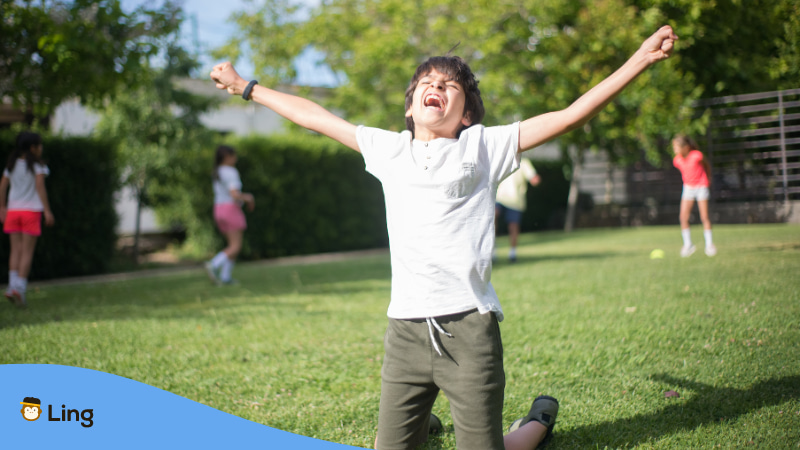
22. ㅇㅈㄴ (OTL)
This one is pretty interesting because the appearance of the letters actually tells its meaning. It’s more of an emoticon than an abbreviation. You can probably picture a man kneeling with his head hanging down (O or ㅇ), his torso and arms on the ground (T orㅈ ), and his legs flat (L or ㄴ).
The abbreviation ㅇㅈㄴ (OTL) shows someone on their knees to show how sad they are. This emoticon is usually used to show defeat, frustration, or disappointment.
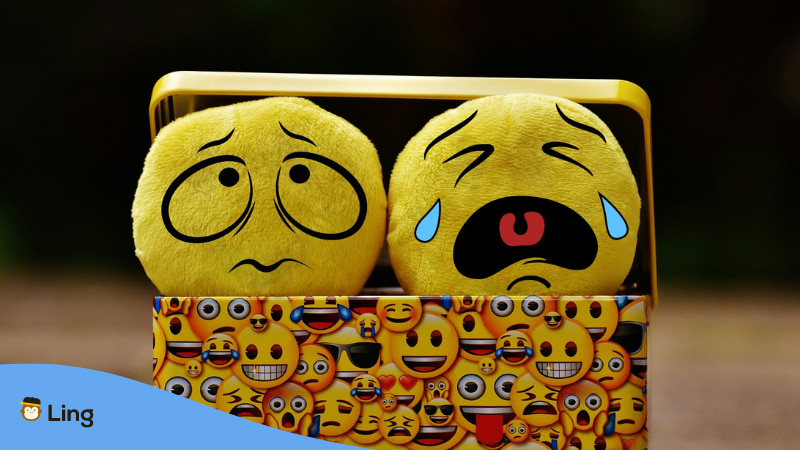
23. ㅠㅠ/ㅜㅜ
Of course, when we talk about emoticons, we cannot miss the crying eyes ㅠㅠ/ㅜㅜ. It is used to indicate sadness to the point that you’re crying. Some also use this to indicate tears of joy. If you type it in a text, it will usually turn into an emoji.
24. 0ㅠ0
Wanna express that you’re disgusted, like you wanna throw up or vomit? You can use 0ㅠ0. By just looking at it, you’ll simply get what it means, especially when you always text or chat.
25. ㅇㅁㅇ
Lastly, the shocked face. This is undoubtedly one of the most used abbreviations or emoticons. It is used when you feel shocked or amazed, like when someone reveals a secret, or you have learned something really incredible.
More Korean Abbreviations
| English Translation | Korean Abbreviation | Meaning/ Origin |
| Ready | ㄹㄷ (ld) | 레디 (Redi) |
| Take it easy | ㅅㄱ (sg) | 수고 (Sugo) |
| Why? | ㅇ? | 왜? (Wae?) |
| Where? | ㅇㄷ | 어디 (Eodi) |
| Did anyone ask? | ㄴㅁㅂ (nmb) | 누물보 (Numulbo) |
| I am fine. | ㄱㅊ (gch) | 괜찬아 (Gwaenchanhna) |
| Okey-dokey | ㅇㅋㄷㅋ (oh-ki-do-ki) | Okay |
| Have fun or Having fun | 잼께 (jaem-ggae) or 노잼 (no-jaem) | 재미있게 (Jaemiitda) |
| Thank you | 고마웡 (go-ma-woong) | 고마워요 (Gomawoyo) |
| Cute way of saying “Me too.” | 나두 (na-du) | 나도 (Nado) |
| “Where r u” or “Where are you?” | ㅇㄷ (ng d) | 어디야 (Eodiya) |
| Bus card charging | 버카충 (beokachoong) | 버스 카드 충전 (Beoseu kadeu chungjeon) |
| Eating alone/drinking alone | 혼밥/혼술 (honbap/honsool) | 혼자 밥을 먹는다 (honja babeul meokneunda)/ 혼자 술을 마신다 (Honja sureul masinda) |
| Dipping and eating/pouring and eating | 찍먹 vs. 부먹 (jjikmuk vs. boomuk) | 찍어 먹는다 vs. 부어 먹는다 Jjigeo meokneunda vs. bueo meokneunda |
| Mom’s friend’s son | 엄친아 (eomchinah) | 엄마 친구 아들 (Eomma chingu adeul) |
| Heart racing | 심쿵 (shimkoong) | 심장이 쿵쿵 (Simjangi kungkung) |
| To be honest with you | 솔까말 (solkkamal) | 솔직히 까놓고 말해서 (Soljikhi kkanohgo malhaeseo) |
| I didn’t ask, and I don’t care | 안물안궁 (anmoorangoong) | 안 물어봤고, 안 궁금해 (An mureobwassgo, an gunggeumhae) |
| Join in when it’s appropriate and leave/ get out when it’s not | 낄끼빠빠 (kkilkkippappa) | 낄때 끼고 빠질때 빠져 (Kkilttae kkigo ppajilttae ppajyeo) |
| World’s prettiest | 세젤예 (saejaelyae) | 세상에서 제일 예쁘다 (Sesangeseo jeil yeppeuda) |
| This is real; it’s so true | ㅇㄱㄹㅇ | 이거레알 (real) Igeo(real) |
| Korean Atomic Energy Research Institute | KAERI | 한국원자력연구원(Hangugwonjaryongnyonguwon) |
| Korean Won | KRW | 원화 (Wonhwa) |
| Korean Food and Drug Administration | KFDA | 식품의약품안전청 (Sikpumuiyakpumanjonchong) |
| Korean Hemorrhagic Fever | KHF | 대한출혈열 (daehanchulhyoryol) |
| Korean Pride | KP | 코리안 프라이드 (Koriyan peuraideu) |
Talk With Your Korean Friends Using The Korean Language Now!
With Korean abbreviations, you’ll be able to engage in a conversation with locals via text or chat. But abbreviations will not be enough if you really want to build connections with them and have deeper conversations. So, why not try to learn Korean with the Ling app?
Treat yourself to a wide variety of engaging and meaningful Korean lessons. Improve your language skills to be able to learn vocabulary words, practice your pronunciation for daily speech, make sentences, understand grammar structure, and more. You can also learn a lot about their culture using blog posts like this because, as we all know, language and culture cannot be separated. You’ll know more about these words when you download the app on your iOS or Android device.
There’s a long way to go in learning Korean. But with the Ling app, every single step of your language-learning journey will be worth it. So, learn Korean with the Ling app now!
Updated by: Gwyn
